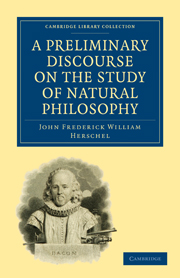Book contents
- Frontmatter
- Contents
- Dedication
- PART I OF THE GENERAL NATURE AND ADVANTAGES OF THE STUDY OF THE PHYSICAL SCIENCES
- PART II OF THE PRINCIPLES ON WHICH PHYSICAL SCIENCE RELIES FOR ITS SUCCESSFUL PROSECUTION, AND THE RULES BY WHICH A SYSTEMATIC EXAMINATION OF NATURE SHOULD BE CONDUCTED, WITH ILLUSTRATIONS OF THEIR INFLUENCE AS EXEMPLIFIED IN THE HISTORY OF ITS PROGRESS
- PART III OF THE SUBDIVISION OF PHYSICS INTO DISTINCT BRANCHES, AND THEIR MUTUAL RELATIONS
- CHAP. I Of the Phenomena of Force, and of the Constitution of Natural Bodies
- CHAP. II Of the Communication of Motion through Bodies. — Of Sound and Light
- CHAP. III Of Cosmical Phenomena
- CHAP. IV Of the Examination of the material Constituents of the World
- CHAP. V Of the Imponderable Forms of Matter
- CHAP. VI Of the Causes of the actual rapid Advance of the Physical Sciences compared with their Progress at an earlier Period
- Index
CHAP. I - Of the Phenomena of Force, and of the Constitution of Natural Bodies
Published online by Cambridge University Press: 29 August 2010
- Frontmatter
- Contents
- Dedication
- PART I OF THE GENERAL NATURE AND ADVANTAGES OF THE STUDY OF THE PHYSICAL SCIENCES
- PART II OF THE PRINCIPLES ON WHICH PHYSICAL SCIENCE RELIES FOR ITS SUCCESSFUL PROSECUTION, AND THE RULES BY WHICH A SYSTEMATIC EXAMINATION OF NATURE SHOULD BE CONDUCTED, WITH ILLUSTRATIONS OF THEIR INFLUENCE AS EXEMPLIFIED IN THE HISTORY OF ITS PROGRESS
- PART III OF THE SUBDIVISION OF PHYSICS INTO DISTINCT BRANCHES, AND THEIR MUTUAL RELATIONS
- CHAP. I Of the Phenomena of Force, and of the Constitution of Natural Bodies
- CHAP. II Of the Communication of Motion through Bodies. — Of Sound and Light
- CHAP. III Of Cosmical Phenomena
- CHAP. IV Of the Examination of the material Constituents of the World
- CHAP. V Of the Imponderable Forms of Matter
- CHAP. VI Of the Causes of the actual rapid Advance of the Physical Sciences compared with their Progress at an earlier Period
- Index
Summary
(232.) Natural History may be considered in two very different lights: either, 1st, as a collection of facts and objects presented by nature, from the examination, analysis, and combination of which we acquire whatever knowledge we are capable of attaining both of the order of nature, and of the agents she employs for producing her ends, and from which, therefore, all sciences arise; or, 2dly, as an assemblage of phenomena to be explained; of effects to be deduced from causes; and of materials prepared to our hands, for the application of our principles to useful purposes. Natural history, therefore, considered in the one or the other of these points of view, is either the beginning or the end of physical science. As it offers to us, in a confused and interwoven mass, the elements of all our knowledge, our business is to disentangle, to arrange, and to present them in a separate and distinct state; and to this end we are called upon to resolve the important but complicated problem, — Given the effect, or assemblage of effects, to find the causes. The principles on which this enquiry relies are those which constitute the relation of cause and effect, as it exists with reference to our minds; and their rules and mode of application have been attempted to be sketched out, (though in far less detail than the intrinsic interest of the subject, both in a logical and practical point of view, would demand,) in the foregoing pages.
- Type
- Chapter
- Information
- A Preliminary Discourse on the Study of Natural Philosophy , pp. 221 - 245Publisher: Cambridge University PressPrint publication year: 2009First published in: 1830

